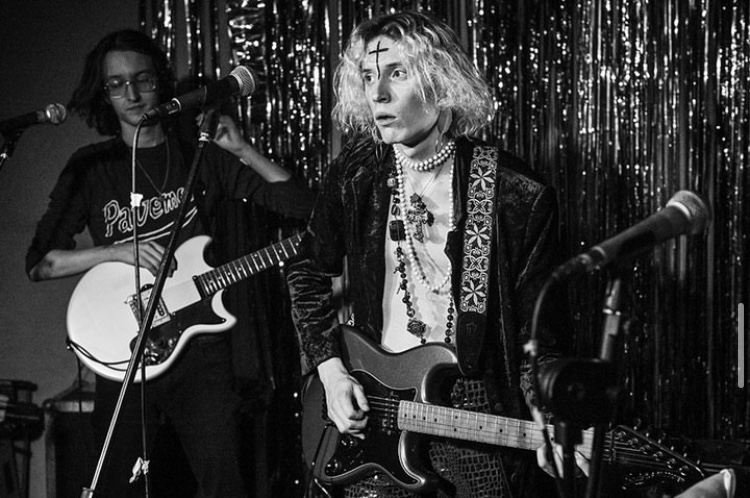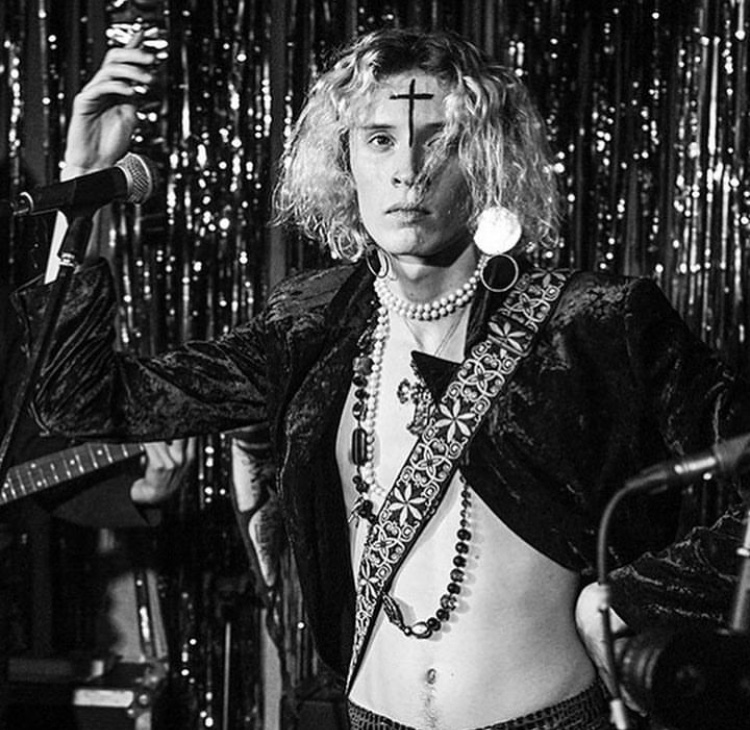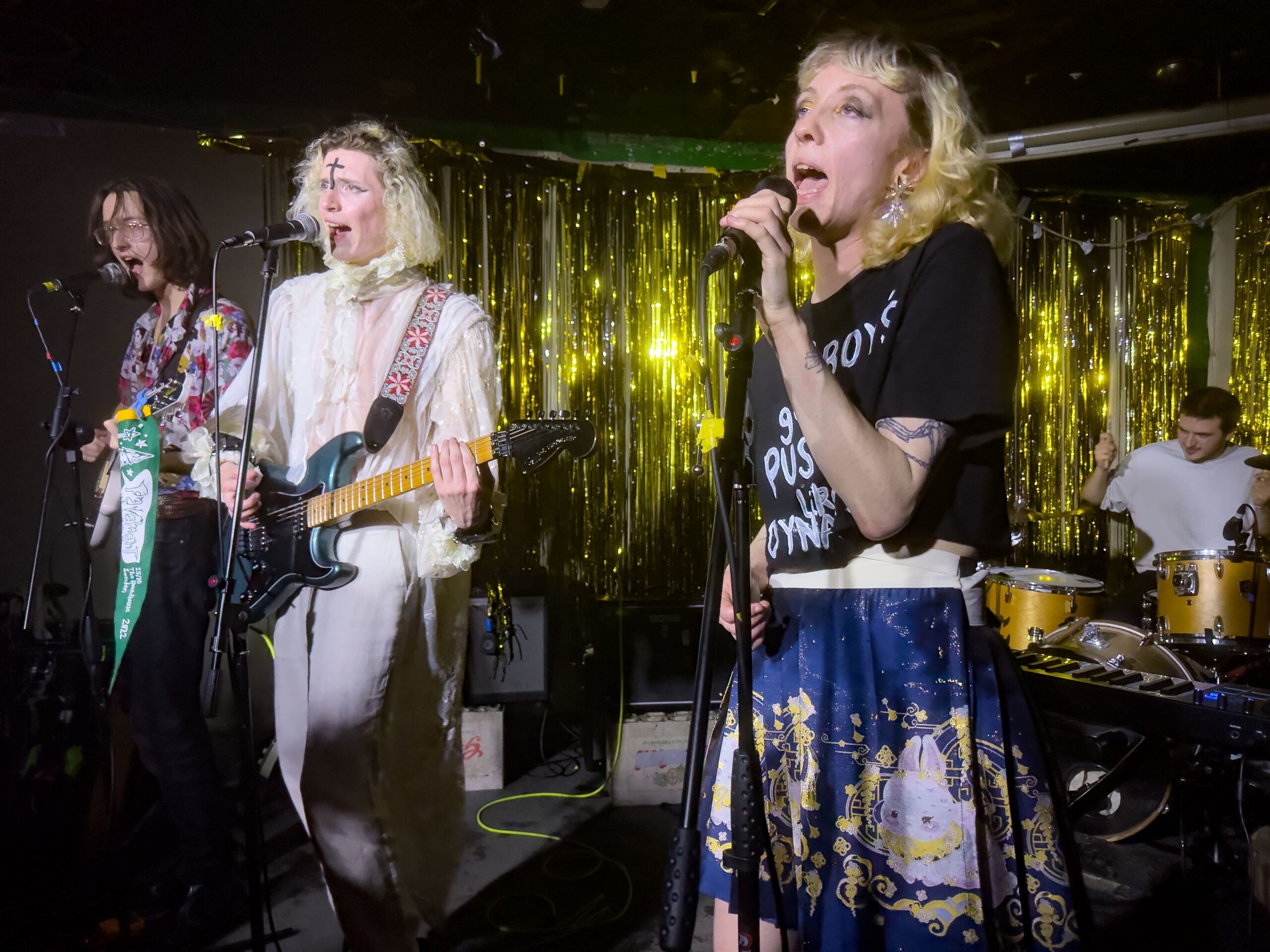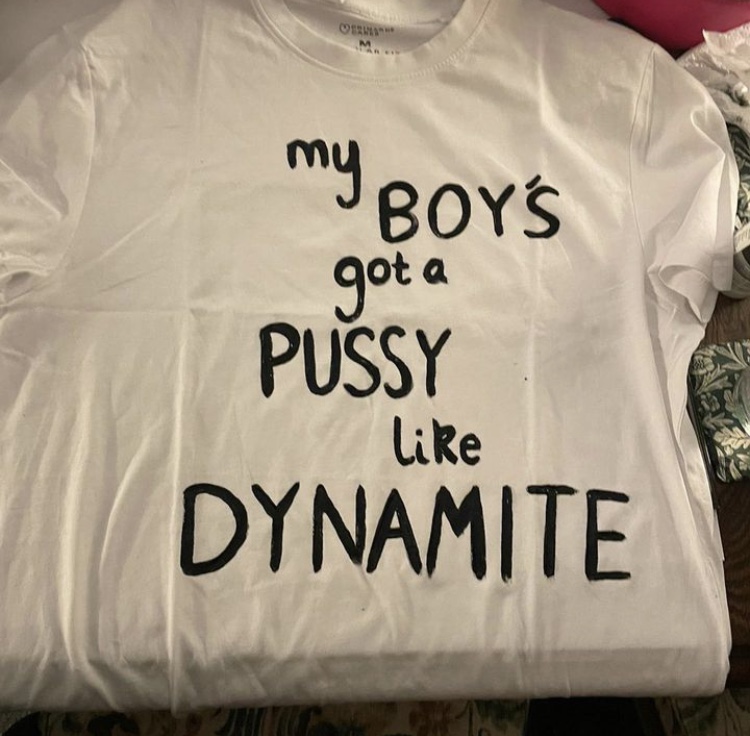RUDI RANCE sat down with FRANCIS WOLFE, a non-binary London musician making ‘music to get pegged to and by’, ahead of their headline gig at the Windmill in Brixton for the release of their new single ‘And Gammorah’, to discuss everything from German Expressionist theatre to the figure of Christ.

Hello. Who is Francis Wolfe?
In a philosophical sense?
No, but we’ll get there.
- Francis Wolfe is my artist name; it’s my solo project. I write all the music and curate all the aesthetic stuff and my band, who are brilliant, play with me every gig. I write all their parts and they contribute too; I try and give everyone free rein. I’m of the mindset that if you give someone a direction and a little bit of leeway, they are going to make something more out of it than if you try to dictate every tiny detail. I can get dictatorial. I have to resist sometimes.
You’ve got a foot in a couple of camps. You played with Gingerella for a while, and you are part of a double act too?
- Yeah, I was with Gingerella for about a year and then left to pursue my own thing more intensely. I’m also part of a folk and country duo called Revalator with my partner Nat, which is much softer and more acoustic. It’s nice for both of us as we aren’t trying to push it and make it like, our career, it’s something on the side.
Would you say music is something key to your personal relationships then?
- Absolutely. Yeah, me and Nat met through music. First as friends and then [as a couple] together. We lived in a warehouse actually!
A warehouse?
- Yeah, it was like a converted warehouse, an all trans warehouse – I’m nonbinary myself – in fact when I first went to the warehouse, I wasn’t trans but, yes, we met there and the first thing we started doing was working on his music. We really clicked and had a lot of fun together. He helped me a lot. He plays harp and backing vocals live, behind the scenes stuff too, he’s always the person I go to for help and feedback, to bounce stuff off of. It’s a very intimate artistic relationship.
What is it about music that allows for such a connection?
- I think for both of us, it came to us as an artistic outlet quite late up, not until the age of about 21. I spent a good deal of my life fixating on acting. All I wanted to be was an actor. Then I got into the industry and found I hated it. I felt very boxed in. At that time I didn’t know I was trans and I think that was a big part of it. I couldn’t quite articulate that at the time. I started doing bits and bobs of music here and there and became happier and happier the more I did it, eventually I sacked off acting entirely. I think [Nat] had a similar trajectory. For both of us it was an expression of agency, with acting you are always beholden to being part of someone else’s work unless you write your own stuff. I write poetry but I’m not much of a play or prose writer. In music if you have an instrument you’re kind of set. It’s your thing, you self-actualise it.
The act itself is quite theatrical, what are you drawing on in the live show or the music in general?
- That’s the thing! The industry I hated, but I still love theatre, film and acting. I did drama and philosophy at uni, and I loved it; it was intellectually and artistically fulfilling. For me the live shows are a way to explore a lot of the things I found most interesting in theatre and performance in a way I couldn’t explore before. I’m really interested in German Expressionism and non-naturalistic performance styles but there are not many parts in German Expressionist plays! (laughs). Everything is Stanislavski and naturalism.
I guess gigging is its own Theatre of Cruelty?
- (Laughs). You say that! But it’s something I’ve thought about a lot. The performance context of theatre is important to how it’s understood. In contemporary theatre everyone sits in a dark room in silence and watches from afar, and there are interesting things you can do with that that you can’t do with a gig. For me though, a gig is a fascinating performance space because its expected that people will move around and yell. It’s more primal maybe. That lends itself to exploring things I was really interested in regarding performance. Stuff like the Theatre of Cruelty and German Expressionism. It has a visceral effect on an audience.
The line between actor and character is lost.
- Exactly. All the great front people in music are playing a character in some respect. Bowie is the most obvious example, but I think every frontperson is performing a character in some way, and finds their voice most when they realise that and lean into it. It’s interesting because you are always in a space between- it’s not mimetic and there’s no fourth wall – so you are always interacting with people. In this character there is an immersive quality to it. When I perform it’s fairly similar to how I am normally but massively amplified.
Philosophically this informs a lot of my lyric writing. That and religion are a very big part of my day-to-day life, my intellectual world and, therefore, my music too. It comes up a lot in my main lyrical interests. There’s a real kind of aesthetic beauty to a lot of philosophical language and concepts. I like to draw on that in my own writing and I feel it’s often not explored. Reintroducing philosophical terminology and concepts into a song brings out the interesting aesthetic qualities of – I don’t know- Heideggerian existentialism! When studying philosophy, I found I wanted to cradle ideas that expanded my world so much. This music stuff is a bit of a way to do that.
I feel like the artistic process is rhizomatic. It’s hard to pin down where one process ends and one begins. I’ve found I produce my best work when I try not to bottle things into one cohesive message and instead follow the lines of flight: let things be multifarious and not exactly super clear. Kurt Cobain is one of my favourite lyricists. With his lyrics, what makes them so good is not that someone could have asked, ‘what exactly are you saying here’, it’s that you hear it and intuitively, it resonates somehow. You don’t need to explain it. There’s a flavour to it. All my favourite lyrics are like, tone poems. If it resonates with me that’s enough.
Faith is a big part of your work too. What is faith to you?
- It’s complicated. I’m sure everyone has a complicated relationship to faith. I grew up catholic, but not in a super religious house. My parents were very open about it. My mum took us to church every week, partly to get us into a good school, which I think is based (laughs). I’m like, fair play! I had an edgy Dawkins / Hitchens atheist phase as a teenager, and I guess for a long time I was fairly agnostic. The more my views formed I became more staunchly socialist, and then I found myself more drawn to religion. Specifically, the figure of Christ, the sense of hope, love, and kindness in the figure of Christ. As a queer person I found resonance in Christ. I always think about the passage in Mark’s Gospel where he essentially articulates, to me, the idea of chosen family. Christianity in general is a very malleable [belief],historically it has been co-opted by every single point on the political spectrum: far right to far left, neoliberal capitalist, prosperity gospel, all that sort of stuff, televangelism all the way down to quakers! When I was younger, the wide ranging, rhizomatic interpretability and its lack of a concrete ‘true’ Christ frustrated me. I wanted everything to be this rigid set of variables. Now that I’m older I find that vast space of interpretability really beautiful. Contained within Christ there is so much possibility to connect with so many aspects of the human experience, so many belief systems and versions of ethical truth. I find [The Bible] deeply nourishing and artistically fascinating. I find a radical kindness in my Christ.
You have your debut single coming out! Would you like to speak on that?
- I do! It’s called ‘And Gammorah’, a song I wrote ages ago; it’s about my dear, dear boyfriend Nat. I guess it’s a love song but it’s very raunchy. The main lyric is ‘my boys got a pussy like dynamite’ (laughs). We recorded it in Market Stall studios, a great studio in North London. I mixed and produced it myself which took fucking ages. I’m fucking really excited about it. For a long time now I’ve been asked when are you going to have stuff online or on Spotify? I’ve always said I wanted it to be right. I’ve recorded stuff at home, but it was really different to go there with my full band and play the song the whole way through live without a click. To have that elasticity of time and just have the feeling of a group of people who know each other well, love each other and know the song really well. I’m really excited to have that coming out and I’m incredibly proud of my band, they fucking nailed it. Even playing the windmill, a few months back this was something I dreamed about, the big goal. I fucking love lack midi and Black Country, New Road (as everyone should), so to play here is a real honour. [The band] is doing so much and it’s a really exciting time. I feel extremely lucky to have a brilliant partner and a band who bring out the music in a way that is deeply gratifying and deeply moving. [We all] believe in the music.
Francis Wolfe’s new single ‘And Gammorah’ is out now on Apple Music and Spotify
Title image courtesy of Neil Anderson







